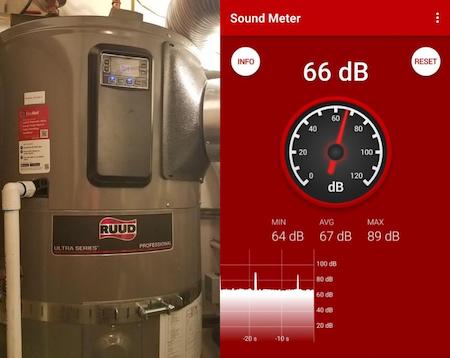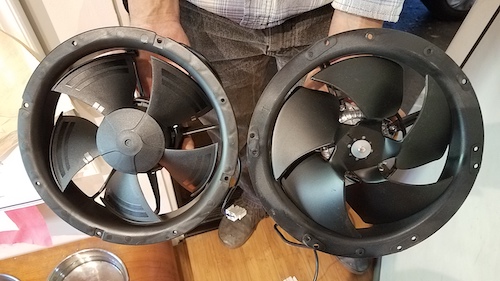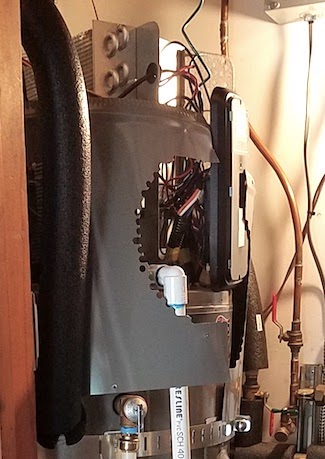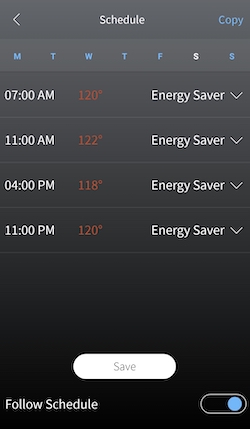One of the reasons that people have favored the Rheem/Ruud heat pump water heaters is because they are quiet. Rated at a low 49 dB, you could install one in most places around the house and not notice it operating. Unfortunately, that is no longer the rule. For the last two years or so, many homeowners have noticed that their newly installed Hybrid Electric Water Heaters (1) are significantly louder than that, even 60-70 dB. Says one contractor I spoke with: “It’s something about the new generation of water heaters. The earlier ones were quiet. The new ones, not so much.”
Another local contractor who has installed many of these over the years says: “We have had to make return visits to a huge percentage of our installs because the clients complain about noise. We have spent hours talking to sales reps. We now stock replacement fans and have had to send our plumbing team back multiple times to replace the factory installed fan in an attempt to quiet the machine. The product we install is listed as the quietest available, yet some of them are louder than a running gas-powered automobile.” An irate contractor made this video for Rheem, which will give you a sense of the sound the water heater is emitting and his frustration with the unit.
I spoke with Ankur Maheshwari, Director of Global Product Management at Rheem, and he confirmed that there has been an issue. “We didn’t see it in our field testing, which is very comprehensive, but it did come up post-deployment. The numbers are tiny, but we did hear about it and took immediate steps to address it.” He explained that the problem was introduced when they were making efficiency improvements, and assured me that it was fixed in Q3 2021.
Well, I’m not sure the numbers are all that tiny, given how many people have reported installing a louder-than-spec’d unit. (Up until recently, you could also read about it in the comments on the Rheem site itself. However, those comments have since been removed.) I also wouldn't say that the issue has been fixed, given that people still report the issue and older ones remain on the market. Rheem would not give me the serial numbers of the units that are quieter, despite multiple requests. They also seem to have removed any reference to the 49 dB spec from their marketing materials. One user reports that they now say units made in 2022 are quieter, but still may emit up to 55 dB when installed.

My Ruud heat pump water heater had a loud hum.
I installed a Ruud heat pump water heater recently -- an 80-gallon, 15-amp version that turned out to be manufactured in April 2021 -- and it was a noisy one. The hum at six feet was 66 dB rather than the spec’d 49 dB. My HVAC guy noticed right away since he had recently installed two quieter ones. The ambient sound level in my garage and house is 35-40 dB, so this was noticeable, even with the door to the utility closet closed and a fully insulated and quietrock’d wall between the closet and family room.
I sighed and got on the phone with Rheem, which has a dedicated support line for these issues at 1-800-995-0982. They walked me through a process, using controls on the heater, to diagnose whether the sound was an installation issue (they like to call out earthquake straps), a vibration issue with the floor, an issue with the fan, or an issue with the compressor. They may recommend one or more of a replacement fan, a foam kit, and a vibration isolation kit based on the results.
In my case the fan was loud, but the contractor was doubtful that was the only issue. Upon removing the large lid of the water heater (the “shroud”) to replace the fan, he noticed that there was no soundproofing despite the lid being essentially a large echo chamber made of thin sheet metal. Another contractor I spoke with made a similar observation, saying that the later models “have less sound absorption material than earlier versions (we disassembled a couple to see the differences)”. Unfortunately, Rheem was out of stock of the foam kits, which are supposed to address the general lack of soundproofing in the top of the water heater.
The new fan arrived the next day (at no charge). Here you can see the old fan on the left and the new fan on the right.

Rheem/Ruud Hybrid Water Heater fans, original on left and replacement on right
The new fan is heavier, with larger blades and a lower blade angle, all of which should and did make it quieter. Unfortunately, installing it was not straight-forward. There was not enough clearance to remove the shroud, so my contractor was faced with either draining, uninstalling, reinstalling, and refilling the water heater, or just slicing through the shroud. He chose the latter.

He then installed some custom-made sound-proofing, which included a thin layer on the inside of the metal shroud, some narrow rubber strips along the grill on the top, and a sound-dampening mat near the compressor.
We took bets on how much this would help and were pleasantly surprised that the sound level came down from about 66 dB at six feet to 54 dB, and 45 with the door closed. You can listen to it here with the door open and here with the door closed. Inside the house this was now barely noticeable. The kitchen on the far side of the garage behind a door was maybe 41 dB with the heater running and 40 without -- not noticeable. The family room, separated from the water heater closet by an insulated wall, is around 40 dB when the water heater is running compared to 35 when it isn’t. Unless it’s very quiet and I’m trying hard to listen for it, I don’t notice it. The schedule is set so that most of the time we’re in there it’s not running anyway.
As you may be thinking, quieting the water heater required hours of labor on the part of my contractor, plus some materials expense. The number to call for reimbursement of labor is Rheem Tech Support: 1-800-432-8373. The support person there told me there is no warranty for labor on heaters bought at wholesale (which mine was), but offered that I could try emailing the receipt to billing@rheem.com. That department pointed me to Wholesale Warranty (800-621-5622, option 4 then 2), where the person said that Tech Support or Billing would handle this. Right.
As I wrote above, this experience is not uncommon. This complaint in an online forum from last year reflects an experience similar to mine: “The hybrid water heater I purchased is very noisy, 62 decibels instead of the advertised 49. I can hear it throughout my house. Rheem said that they would send me a foam insulation kit and pay to have a plumber install it. The water heater is installed per Rheem’s instruction. They say to allow for 7 inches of clearance on top and mine has 10 1/2 inches. In order to install the foam insulation kit around the fan, the 12 inch high top has to be removed. So the water heater needs to be removed and reinstalled. Rheem is refusing to pay for the labor. I was told this after waiting on hold for 90 minutes. A supervisor is supposed to call me back. Additionally, the technician on the phone denied that Rheem advertises a 49 decibel noise level. Then he said that this was only in an ideal environment.”
So. If you order a Rheem/Ruud Hybrid Water Heater, you may get a louder than expected appliance and Rheem’s support may not be of much help. As a result, I have some suggestions for you:
1. Do not install one of these if you need it to run at 49 dB. Even with a newer model or good fixes, it may run up to 55 dB or so. Walk around your house with a sound meter to get familiar with what different dB ratings sound like. I used the Sound Meter app on an Android phone, and there are similar apps for iPhone. A microwave might be a good proxy for 50-55 dB. Try putting one where the water heater would go and measure it. Or stop by to listen to a heat pump water heater at a friend’s or neighbor’s house.
2. Ask if the plumbing supply store where you are buying it will sell you one made in 2022. Those may be quieter. Rheem has not recalled the older units and they are still available on the market.
3. Make sure you have a plan for what you will do if you get a noisy water heater. You may want to check if your contractor has replacement fans and foam kits on hand, or otherwise knows how to improve the sound proofing. One contractor says he is testing out a fairly easy fix, strapping two layers of thin soundproofing material around the shroud (avoiding the air intake and outflow and display). I will update this post if that proves as effective as he thinks it will be. (See update below!)
4. Once the water heater is installed, listen to it. Listen not only from a distance of 3-6 feet, but also from any adjacent rooms, with doors open or closed as normal. A low whoosh or hum is normal when it is operating. If it seems loud, especially in your living areas, measure it and talk with your contractor.
5. Consider setting the water heater’s schedule so it runs less at certain times. For example, I set the temperature to 122 between 11am and 4pm, then set it to 118 between 4pm and 11pm. I do this so it uses cleaner energy, but it also means it runs less in the evenings when we use the family room more.

6. Do not hesitate to call Rheem at 1-800-995-0982 if your water heater is noisy. They are very familiar with these issues. Make sure to have the serial number of your water heater on hand when you call. Then call 1-800-432-8373 or email billing@rheem.com to request reimbursement for labor.
I am sorry to have to share this information, but I want you to be prepared for this eventuality. I have no complaints about the water heater now that it is up and running. It actually works better than my gas one, which I was not expecting. (My contractor thinks that is because a valve on the gas one may have allowed the temperature to vary too much.) The heat pump water heater is very efficient, currently using around 2 kWh/day, and it is much better for the climate. I also like having an app that lets me schedule it, turn it down on vacation, etc. But it took the contractor longer than expected to install, required some creativity on his part, and added about $500 to the cost of installation.
I am also pretty unhappy with how Rheem has been managing this. While their customer support tries to be helpful, the company in general has been less than straight-forward with customers and contractors. They are not making an effort to recall the noisier units and are unable to keep the foam kits in stock.
Rheem had no comment when I sent them a preview of this blog post. Heat pump water heaters are also available from AO Smith, Bradford White, and Stiebel Ultron. Bradford White promises “average 55 dB” while Stiebel Ultron promises 52 dB at 3 feet.
Update!
A contractor for SunWork provided this helpful information about a relatively easy patch for a noisy heat pump water heater from Rheem/Ruud:
Our customer has a bedroom directly over the garage where the water heater is installed, so that's where we were taking sound level measurements.
Without mitigation, sound level readings in that bedroom were coming in at 59 dB. With one layer of mass-loaded vinyl we were reading 52 dB. Two layers gave 50 dB. Three gave 48 dB. We left all three layers in place.

This is the MLV that we used (the 1/4-inch, 20 sf roll), which was great because the cosmetic defects weren't hurting anybody in this application, and you basically get three water heater layers out of it with no waste. But the B-stock is not always available.
This is the hose clamp kit that we used.
Minimum total materials cost for a one-off retrofit, without any B-stock discount, would be $156.95 before tax. If buying the MLV a full roll at a time and getting higher-count hose clamp kits, the per retrofit materials price gets down to $124.85 before tax.
Notes and References
1. Rheem/Ruud call their heat pump water heaters “hybrid electric water heaters,” referring to the fact that they have both a heat pump and an electric resistance element that can be used to fill the tank faster when needed.
2. Rheem and Ruud heat pump water heaters are the same design, same parts, and made in the same facility, as confirmed by Ankur Maheshwari, Director of Global Product Management at Rheem.
Current Climate Data (April 2022)
Global impacts, US impacts, CO2 metric, Climate dashboard
Terrific news from Australia, where Labor won the election promising to accelerate action on climate change. From CNN:
“The climate crisis was one of the defining issues of the election, as one of the few points of difference between the coalition and Labor, and a key concern of voters, according to polls.
Marija Taflaga, lecturer in politics and international relations at the Australian National University, said the swing towards the Greens was remarkable. 'I think everyone has been taken by surprise by these results...I think it will mean there will be greater and faster action on climate change more broadly.'
Labor has promised to cut emissions by 43% by 2030 and to reach net zero by 2050, partly by strengthening the mechanism used to pressure companies to make cuts.”
Comment Guidelines
I hope that your contributions will be an important part of this blog. To keep the discussion productive, please adhere to these guidelines or your comment may be edited or removed.
- Avoid disrespectful, disparaging, snide, angry, or ad hominem comments.
- Stay fact-based and refer to reputable sources.
- Stay on topic.
- In general, maintain this as a welcoming space for all readers.



